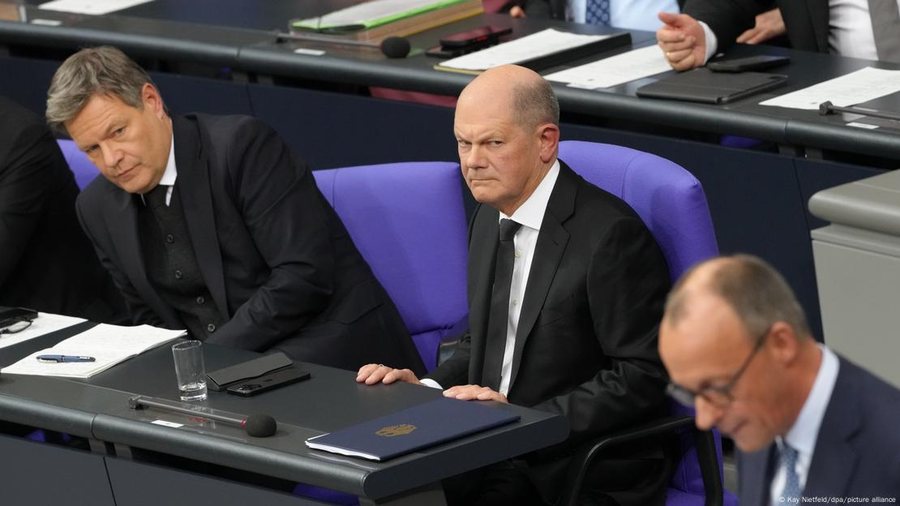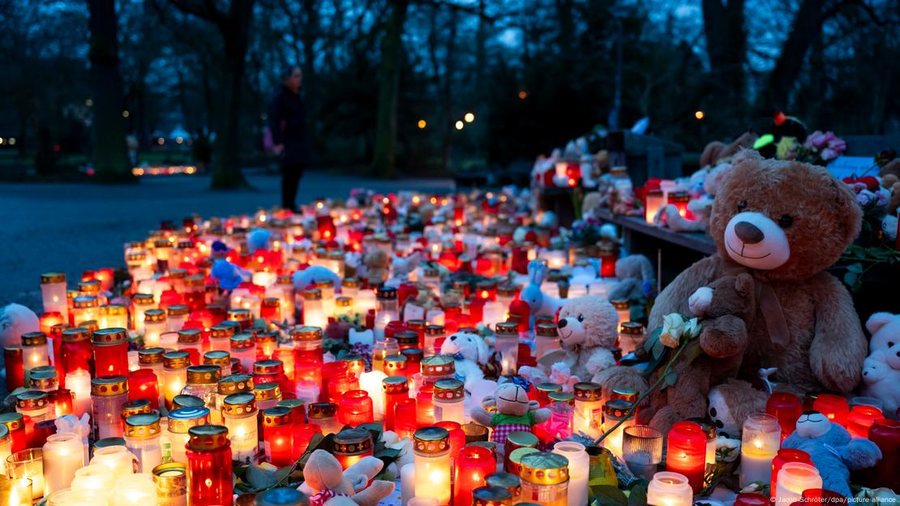
The Bundestag debated on Wednesday (29.11.) in a heated atmosphere about the right course of action in asylum and immigration policy. The debate was sparked by the leader of the conservative opposition, the head of the CDU, Friedrich Merz, who is a strong contender to become the new chancellor after the new Bundestag elections on 23 February. His parliamentary group, consisting of the CDU and its sister party in Bavaria, the CSU, had presented two motions in the Bundestag aimed at significantly tightening migration policy. One of the motions was approved with the votes of the AfD, which has elements of the far-right in some of its ranks, a first in the history of the German parliament.
Scholz: "The right to asylum is a lesson from history"
At the beginning of his speech, a visibly tense Chancellor Olaf Scholz (SPD) said in the government statement that the CDU and CSU were attacking the essence of the right to asylum with their proposals: "The right to asylum is also a direct response to the horror of the Nazi regime. At that time, Germans and European Jews were rejected at foreign borders. The lesson of history is that this must never happen again, and Germany must never allow it to happen again." Scholz called Merz's plans illegal. The CDU leader had "emotionally" abandoned the consensus not to cooperate with the far right.
Merz: "We will do what we think is right"
The CDU chancellor candidate had made it clear in recent days that he would also accept the votes of the far-right Alternative for Germany (AfD) party to pass the proposals. Among other things, he told ZDF: "We in the unionist parliamentary group are doing what we believe is right in this matter. And if the AfD agrees, then it agrees. If it doesn't agree, let it go."

Murder in Aschaffenburg
The debate has heated up in recent days with the murder in Aschaffenburg, Bavaria, last week, in which two people, including a two-year-old child, were stabbed to death. The suspected perpetrator has been arrested and is from Afghanistan. This terrible act is also one of the reasons why the issue of migration and asylum is currently the most important in the election campaign. The Bundestag commemorated the victims at the beginning of the debate with a minute's silence.
Merz: We finally need effective decisions
But how can security be strengthened with the AfD as the majority provider? Until recently, the conservatives in the CDU and CSU had insisted that they would not cooperate in any way with the far right. In fact, the CDU had added a passage to the motions in which it harshly criticized the AfD's policies.
Now Merz has told the Bundestag that after the attacks in Aschaffenburg and Magdeburg before Christmas, politicians must finally act: "If the compassion and sympathy after such attacks are not to degenerate more and more into a political ritual, then they must finally take, at the latest after Magdeburg and Aschaffenburg, decisions against the influx of illegal refugees into Germany and against the illegal stay of refugees in Germany."
Churches: "Don't denigrate all immigrants in the bloc"
Merz's approach has also been heavily criticized outside parliament, by church representatives. Addressing parliamentary groups in the Bundestag directly, representatives of Berlin's Protestant and Catholic churches said: "We are deeply concerned about the timing and tone of the current debate." They went on to say that the debate is likely to "denigrate all immigrants living in Germany and fuel prejudice."
A minority government
What makes the situation with the two motions presented by the conservatives so explosive is that since the collapse of the three-party coalition between the SPD, the Greens and the FDP last November, Chancellor Scholz's minority government no longer has a majority in parliament. But the conservatives, together with the AfD, the FDP and the Sahra Wagenknecht Alliance (BSW), do. After the vote, Merz said he regretted the AfD's approval. A second motion presented by his CDU/CSU group was rejected.
Permanent checks and returns after
The first motion called for, among other things, permanent border controls with all neighboring countries and a ban on entry for all persons without valid entry documents, even if they express a desire for protection. Those who are forced to leave the country should be arrested and deportations should be carried out on a daily basis, he continued.
In the second motion, the CDU called for a “change in national security policy.” However, neither motion obliges the federal government to act accordingly.
Friday in the Bundestag: the asylum issue again
The CDU and CSU want the Bundestag to vote on a tougher law on Friday. The plan includes, among other things, restricting immigration and ending family reunification for beneficiaries of subsidiary protection. This concerns people living in Germany who have not been granted asylum but are allowed to stay in Germany for the time being for other reasons.
The AfD, the FDP and this time the BSW have announced that they will vote "yes". But this law will have to be finally approved by the Bundesrat, the representation of the 16 federal states. Whether this will happen is more than uncertain. In any case, the Bundesrat will not discuss this issue until after the new elections on February 23. /DW/ (A2 Televizion)











